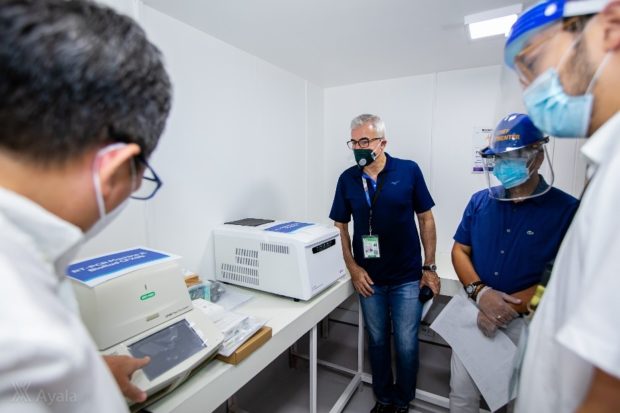
Fernando Zobel de Ayala at a testing lab in QualiMed Sta. Rosa, a COVID-19 referral hospital
Five of the country’s top conglomerates have added financial muscle to the Ayala group’s initiative to build four new coronavirus (COVID-19) testing laboratories nationwide – another affirmation of corporate Philippines’ commitment to fight the pandemic that has disrupted business and people’s way of life.
Ayala Healthcare Holdings Inc (AC Health) has teamed up with the Aboitiz Foundation, ABS-CBN Corp., Alfonso Yuchengco Foundation, Gokongwei Brothers Foundation, and Metrobank Foundation to build these confirmatory reverse transcription polymerase chain reaction (RT-PCR) modular laboratories in various hospitals under the QualiMed network.
The corporate consortium was formed as part of the Ayala group’s initiative to contribute an additional capacity of 5,500 confirmatory RT-PCR tests per day in support of the government’s “test, trace, treat” or T3 project that aims to jack up national testing capacity to 50,000 tests per day by end-June.
“Increasing the country’s confirmatory testing capacity is not easy. We are grateful to have been able to form a consortium of friends from the private sector who are just as committed to battling this pandemic. The challenges we are all facing highlights the importance of private sector working in collaboration with the government to ensure our country’s recovery,” AC Health chair Fernando Zobel de Ayala said in a press statement on Friday.
The labs will be located in hospitals of the Qualimed Health Network in Sta. Rosa, Laguna, San Jose del Monte, Bulacan, Tanauan, Batangas, and Iloilo City, Iloilo. Each lab, equipped with one automated RNA extractor and two RT-PCR machines, will have the capacity to perform 1,000 RT-PCR tests per day. They are expected to be accredited and operational by July 2020.
Based on a memorandum of agreement with the partner companies, donations will be used to fund the construction of facilities and the purchase of equipment for the new laboratories to be built under the Qualimed Health Network. These are on top of the existing COVID-19 initiatives already undertaken by these corporate partners.
“The Aboitiz Foundation is looking forward to partnering with AC Health and other private sector partners for this initiative. Our country needs to ramp up its confirmatory testing capacity, especially for our vulnerable communities, and we will do all that we can to respond to that need,” said Sabin Aboitiz, Aboitiz Group president and CEO.
“ABS-CBN will continue to serve the Filipino people and work with our partners to address the COVID-19 pandemic. Apart from our other initiatives, we hope this donation will reach critical areas that require much-needed access to confirmatory testing,” ABSCBN president and CEO Carlo Katigbak said.
Alfonso Yuchengco Foundation (AYF) chair Helen Dee said her group was one with the government and the private sector in addressing the gaps in the country’s response to the pandemic. “We are strong advocates of testing and hope that this initiative will strengthen the government’s efforts to control the spread of COVID-19,” she said.
“We at the Gokongwei Brothers Foundation continue to mobilize efforts for COVID-19. From our frontliner relief efforts to our contributions to Project Ugnayan, we believe that this partnership is a great addition to the work we are doing. Through this, we aim to support the government’s request to help expand testing capacity in the country. We definitely see this as a priority,” said Lisa Gokongwei-Cheng, general manager of the Gokongwei Brothers Foundation.
The Ty family likewise backed this collective response to the health crisis.
“The Metrobank Foundation remains an ally of the government, private sector, and Filipino communities in the ongoing fight against the COVID-19 pandemic. We hope that this partnership will contribute to arresting the spread of the virus through increased testing capacity,” said Aniceto Sobrepeña, president of Metrobank Foundation.
The labs to be built are “biosafety level 2” hubs, which cover labs that work with agents associated with human diseases that pose a moderate health hazard. The modular labs follow the recommended design by the Department of Health, Research Institute for Tropical Medicine and World Health Organization.

